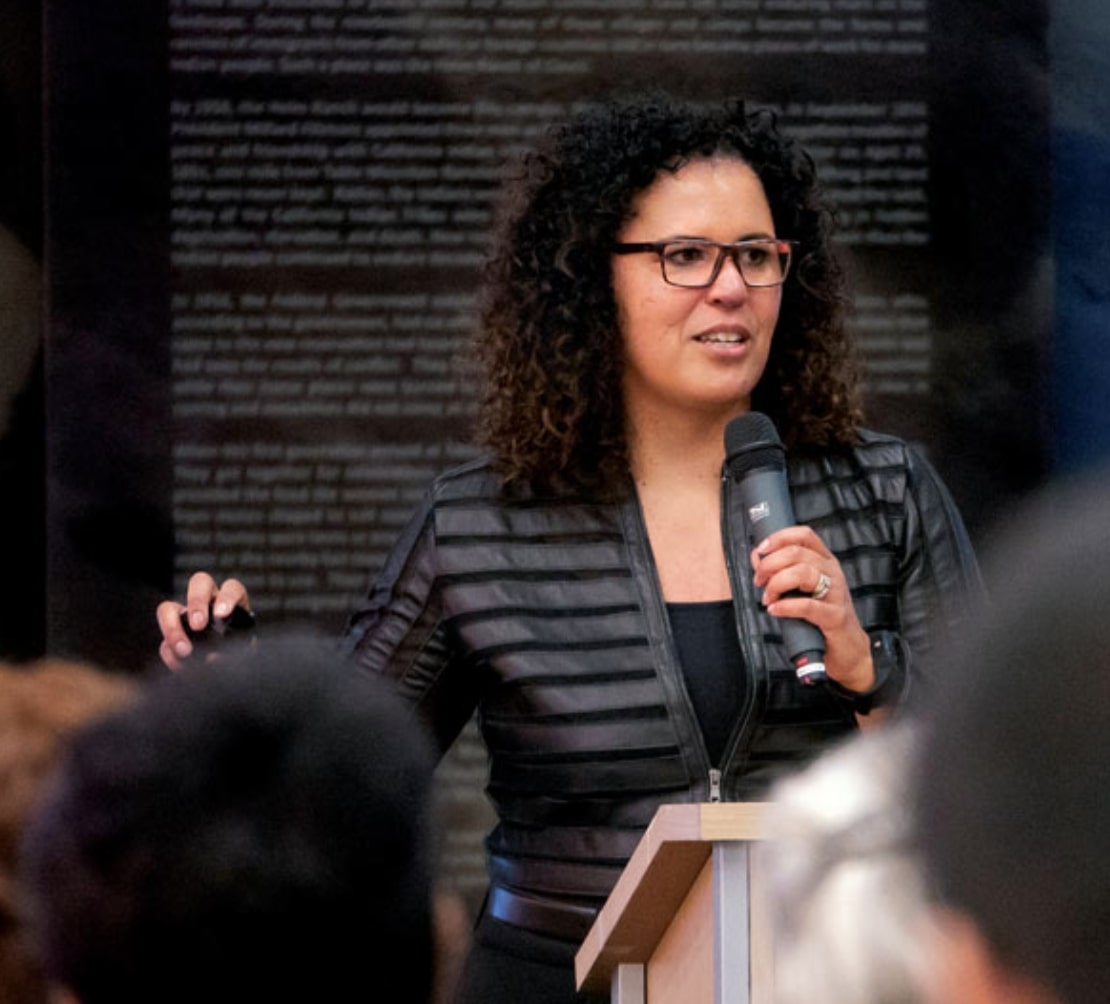“Algorithms of Oppression: How Search Engines Reinforce Racism”
University of California professor, Safia Nobel hosts lecture on the process of writing her book. PHOTO CREDIT: http://safiyaunobel.com/
More and more people of color today are sharing their experiences with being algorithmically suppressed or shadowbanned, but Safiya Noble has been writing about it for years.
The University of Rhode Island’s first lecture in the “Voices for Information Equity” series featured “A Conversation with Dr. Safiya Noble” on Jan. 27, where she spoke about the process of writing her book on bias in algorithmic commercial search engines, “Algorithms of Oppression: How Search Engines Reinforce Racism.”
Noble is a professor of gender studies and African-American studies at the University of California, Los Angeles, and holds affiliations in the School of Education & Information Studies. She is the author of “Algorithms of Oppression: How Search Engines Reinforce Racism” and was recognized as a MacArthur Foundation Fellow in 2021 for her work on algorithmic discrimination. The fellowship is an award given by the John D. And Catherine T. MacArthur Foundation to individuals who have shown dedication and individuality in their creative pursuits
The lecture began with an opening statement from Melissa Villa-Nicholas, an assistant professor in the Graduate School of Library and Information Studies at URI, who moderated and interviewed Noble during the event. President Marc Parlange then introduced Noble, the keynote speaker for this talk.
Noble was first asked by Villa-Nicholas what it was like to receive the MacArthur Fellowship, and she said that she initially thought the call was a scam.
“So, for about two weeks I’ve been getting this call from a Chicago number,” Noble said, “which the MacArthur Foundation is headquartered in Chicago, and I was just constantly like decline, decline, decline. I mean, I almost blocked this number.”
The fellowship allows recipients to pursue their own creative interests. Along with paying off her student loans, Noble used the fellowship to launch a nonprofit organization, The Equity Engine, which aims to support women of color “working at the forefront of digital, civil, and human rights,” according to the organization’s website.
Noble was born in the 1970’s in Fresno, California, where she was surrounded by older Chicano Latino activists in high school that impacted her early views on activism. Later in life, she met her husband and moved to Illinois. They worked at a small advertising firm in 2006 when signs of the 2008 recession started to show, so she decided to go to graduate school at the University of Illinois Urbana-Champaign as a place to reinvent herself and her career.
“For me in this kind of cis, heteronormative married life, new identities get thrust on you,” Noble said. “So, like all these new expectations. Grad school became a place where I could at least just have my own space. It was actually, it felt like a feminist move to kind of reclaim my own sense of self.”
Because of her experience in advertising, constantly pitching ideas to clients, Noble was an experienced public speaker. Villa-Nicholas mentioned a mutual friend they had in common and how the friend had asked Noble for speech-giving advice, and Noble said: “to tell the truth.” Noble said that she and her husband always say this as a reminder before either has to speak at a big event and that honesty is incredibly grounding.
“I do think, you know, that if we can train ourselves as scholars to not be performative but to be connected to our work and to do work that’s meaningful to us,” Noble said. “And then speak honestly about that, I think that’s actually a good practice for ourselves as human beings, but also I think for many people of color and especially women of color, LGBTQ+ communities, people who feel vulnerable in the world already.”
Noble especially stressed the importance of honesty when faced with unjust issues, such as when a close professor told her to abandon her work about discriminatory computer codes. They invalidated her work and crushed her at the time.
Now, a decade later, the ideas in her work are talked about every day regarding social media. Some of these modern-day ideas discuss shadowbanning, when a platform reduces the visibility on a person’s content unknowingly, which disproportionately affects people of color.
“There’s not a day, there’s probably not an hour, that goes by that someone isn’t tweeting about on Instagram or TikTok talking about being shadowbanned, talking about being algorithmically suppressed,” Noble said.
Noble ended the talk with her wishes for the future of algorithms.
“I tell my students what I hope is that before my career is over I get to travel the world and write about the world’s best swim-up bars, because we don’t have these problems, you know, because we’ve figured out how to intervene.”
She said that she hopes for strong digital civil rights legislation and protections, and says that everyone should be aiming for policy to achieve progress.
The next lecture in the “Voices for Information Equity” series will take place on Feb. 24.

